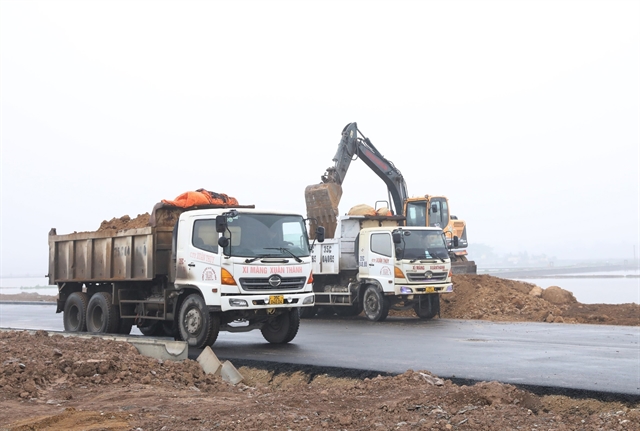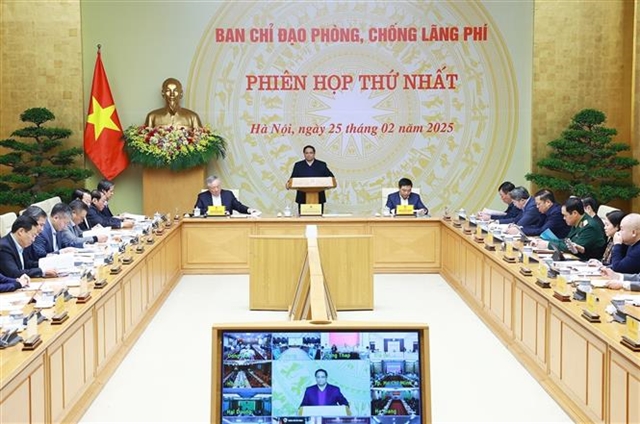 Politics & Law
Politics & Law

 |
| Prime Minister Phạm Minh Chính speaks at the first meeting of the Steering Committee for Wastefulness Prevention and Control on Tuesday. VNA/VNS Photo |
HÀ NỘI — Prime Minister Phạm Minh Chính has urged action to remove obstacles, resolve bottlenecks and prevent resource wastage in numerous long-delayed investment projects across various localities.
As head of the Steering Committee for Wastefulness Prevention and Control, he made this call during the committee's first meeting, held online on Tuesday with representatives from 63 localities.
During the meeting, leaders from ministries, sectors and local authorities acknowledged that wastefulness remained widespread, particularly in the management of public finances, State assets, public investment, land and mineral resources. These inefficiencies led to serious consequences, depleting resources and creating invisible barriers to socio-economic development.
Notably, delegates pointed out that institutional shortcomings were partly to blame for these inefficiencies.
According to the Ministry of Planning and Investment, more than 1,000 projects in 26 central agencies and 62 localities are currently facing difficulties. These include 181 public investment projects, 801 private-sector investment projects and 60 public-private partnership (PPP) projects.
However, the actual number of stalled projects at the local level is likely much higher, as many cases have yet to be fully accounted for, and the complexity of resolving them varies by jurisdiction and authority.
The primary obstacles and challenges stem from a lack of investment capital, outstanding construction debts, delays in land-use conversion and site clearance, overlapping planning, and incomplete procedures for land allocation and leasing. Additionally, issues arise from non-compliance with bidding and auction regulations for investor selection as well as difficulties in sourcing construction materials.
Delegates proposed further institutional improvements and the establishment of special mechanisms to resolve challenges, particularly for projects with identified violations following inspections and audits.
They also emphasised the need for timely guidance on asset and infrastructure management to prevent waste during the restructuring of the political system’s organisational framework.
Concluding the meeting, PM Chính instructed ministries and relevant authorities to promptly address local concerns and escalate unresolved matters to higher authorities when necessary.
He tasked the Ministry of Finance with drafting a decision to restructure the Steering Committee’s membership in line with the new organisational framework, formulating the committee’s 2025 action plan, assigning specific responsibilities to each member and preparing a Prime Ministerial directive on waste prevention and control.
PM Chính acknowledged that waste prevention efforts had been closely directed by the Government and actively implemented by ministries, agencies and localities, yielding initial positive results.
He cited progress in Đà Nẵng, where over 1,300 projects were set to be resolved, as well as the completion of projects such as the branches of the Việt Nam-Germany Friendship and Bạch Mai hospitals in Hà Nam Province, the restructuring of four banks, the Block B gas field project, the Ô Môn Thermal Power Centre and key energy projects like the 500kV transmission line (Circuit 3).
Despite these advancements, he stressed that wastefulness persisted in public asset management, public investment, land use, natural resource allocation and overall resource use. He urged a frank assessment of the situation and the swift implementation of effective solutions within the shortest possible timeframe.
PM Chính emphasised that waste prevention must become an ingrained, voluntary practice rather than a forced obligation. He called for decisive action through well-defined plans, objectives and solutions. This must include a comprehensive review and swift completion of regulations, policies and laws, particularly the drafting of the Law on Practicing Thrift and Combating Waste and the National Strategy on Waste Prevention.
In response to emerging and unprecedented challenges, he highlighted the necessity of special legal and policy frameworks to provide an appropriate regulatory foundation for effective solutions. He urged a review of administrative procedures that cause delays and waste resources, advocating for administrative reforms and greater decentralisation in public investment management, ensuring that local authorities have both decision-making power and accountability.
Additionally, PM Chính directed ministries and localities to accelerate the adoption of smart governance and digital transformation, particularly in land management, public assets and financial oversight. He called for the application of digital technologies, artificial intelligence and big data in management and supervision while ensuring interoperability between data systems across agencies.
Finally, he instructed bodies and local authorities to develop concrete action plans for waste prevention and contribute to the Steering Committee’s 2025 work plan. — VNS




